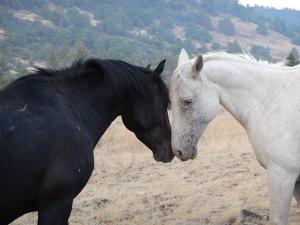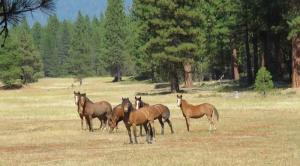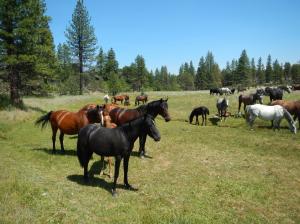Killing the 'Wild' in Wild Horses - The Travesty of American Wild Horse Advocacy and Management
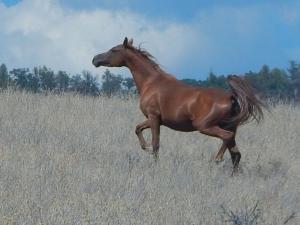
The genetic vitality of wild horses is clearly visible in this gorgeous mare that lives in a wilderness area beyond the reach of advocates shooting horses with PZP and BLM/USFS roundups. In the wilderness, co-evolved predators engage in Natural Selection,
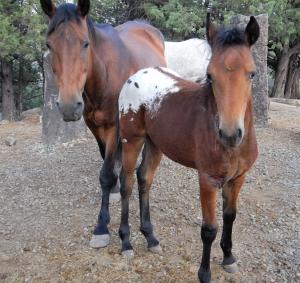
Genetic viability is at risk in American wild horse herds; using contraception is exaserbating that problem placing the species at risk of genetic bottleneck.
Simpson may be the only researcher in America today who lives-among and studies free-roaming wild horses (mustangs) in a wilderness area (24-7/365), and has been doing so for the past 7-years from his cabin in the mountains on the Oregon-California border.
Over the years Simpson has captured thousands of photographs and dozens of videos that evidence the benefits wild horses provide in the ecosystems where they live.
Simpson's full-time studies are important because there are free of the huge gaps in time that are part of other abbreviated studies that suggest many posits about wild horse behavioral ecology that are not fully informed.
Having less than a fully-informed perspective leads to management and advocacy positions that are based-upon what may be called 'snapshot observations', where such studies are made via very short-term field trips, usually watching wild horses at great distances over a sandwich and a telephoto lens. And there is no doubt that by using such an abbreviated observational study methodology, important things are missed.
Simpson is using an observational study method that was pioneered by Miss Jane Goodall (PhD) when she first went to Gombe Africa to study the Apes there in the early 1960's.
The new documentary film 'Jane' helps people to understand how Jane Goodall made discoveries that traditionalist scientists of that era failed to make because of their limited observational paradigm used to study the Apes. https://www.youtube.com/watch?v=46ezsVziu_o
William Simpson has written about the importance of Goodall's observational method in an article (linked below), which helps to further explain why there are so many gaps in the understanding of wild horses and related misinformation about wild horses:
https://www.linkedin.com/pulse/new-paradigm-observational-study-native-species-wild-horses-simpson
Given the gravity of the unfolding management disaster of American wild horses by the Bureau of Land Management (BLM) and the United States Forest Service (USFS), new, out-of-the-box thinking is desperately needed, not more of the same-old tried and failed methods or artificial band-aid fixes like 'selective breeding' using 'porcine zona pellucida' (PZP).
PZP is a chemical that is an FDA registered pesticide, and is being used 'off label' as so-called contraception on wild horses in lieu of Natural Selection.
FDA labeling for PZP: https://www3.epa.gov/pesticides/chem_search/reg_actions/pending/fs_PC-176603_01-Jan-12.pdf
However, the use of any contraception on wild horses (or wildlife) is indeed human's engaging into the 'selective breeding' of wild horses (wildlife), which causes genetic erosion, further adding to the BLM's and USFS's wrong-headed roundups.
More about the use of PZP and 'selective breeding here: https://www.einnews.com/pr_news/552908330/wild-horses-selective-breeding-and-roundups-are-driving-herds-to-extinction
The combination of selective-breeding via PZP, along with massive roundups is taking local herd levels below the absolute required minimum populations of 'breeding adults' (250 breeding adults) to maintain genetic diversity and help minimize inbreeding. These so-called 'management' methods are insidious since they profess to manage wild horses in a positive manner, when in reality, the result of these methods is a management disaster that assures the loss of genetic diversity and genetic vigor in the gene-lines of American wild horses. With the final end result of these unnecessary artificial methods being the extinction of wild horses their remaining genetic blood lines.
Solutions that sound good, but really aren't:
As well-intentioned as the notion of adopting wild horses is, far too much noise is being made in the media about wild horses (mustangs) being adopted or used by prisoners and 'broke' for resale as saddle horses..
Wild horses are highly intelligent sentient beings with highly evolved societies and strong family-bonds and values.
Imagine for a minute being torn from your family and being molded into serving the needs of someone else! Or if you're a parent and seeing your children taken from your side and never knowing what happened to them. Viewing the acts being perpetrated upon the families of wild horses from this perspective is a more accurate assessment of what is happening.
Capturing wild horses, and then separating them from their beloved family members, breaking their wild-spirits, and thereby causing them to suffer PTSD and chronic depression, is simply a draconian solution from the minds of humans, based upon self-serving human perspectives and values, without any regard for what matters to wild horses. This cruel paradigm must end.
Mahatma Gandhi stated that: "The greatness of a nation and its moral progress can be judged by the way its animals are treated."
This critique about channeling wild horses into somehow serving humans is relevant given that in reality, less than about 5% of all the wild horses rounded-up end up living a captive-life separated from their families via these short-sighted and arguably inconsiderate methods. This paradigm demonstrates a lack of compassion and the willingness to employ management that considers the needs of the wild horses as the priority.
Meantime, the other ~95% of wild horses being rounded-up end-up captive prisoners. separated from their families, in off-range holding facilities, as unknown numbers of them are allegedly sequestered away out the back-gate and end-up over the American border in slaughter houses along with thousands of unwanted domestic horses...
It's all connected; all of the native flora and fauna in any ecosystem is co-evolved, and when you impact one species, that impact resonates throughout the entire ecosystem with adverse effects.
Recently, an article in 'The Horse' titled; 'Equine Innovators: Exploring Demand for Wild Horses' highlighted Dr. Stowe's concept of finding uses for wild horses, but seems to miss a very important point:
American wild horses are native species 'wildlife', according to leading scientists, like Professor Ross MacPhee at the American Museum of Natural History.
The entirety of concepts that seek to capture wildlife and then utilize them somehow to serve humans, especially wild horses, is scientifically obtuse since it fails to consider the value proposition of their critically important evolved roles as keystone herbivores in wilderness ecosystems.
By removing wild horses from wilderness ecosystems, the flora and fauna, as well as forests, riparian areas and fisheries of those ecosystems suffer in many ways, as well as the few wild horses that may be left remaining.
Moreover, we already have over 7-million domestic horses in circulation in America today.
As such, at any given time, there are thousands of those domestic horses that desperately need training, re-homing and adoption, even as sanctuaries are filled-up with perfectly good domestic horses.
Some of these domestic horses can also be used as therapy horses. There is no need to steal the freedom of a wild horse and break-up a loving family, when there are abundant domestic horses, specifically bred over the past 4,000-years to fill the needs of humans.
It now appears that the Sierra Club supports the position that wild horses are indeed 'wildlife', and have adopted new policy:
From Tri-State Livestock News:
"On May 2021, the Sierra Club’s 15-member Board of Directors adopted a new policy that likens wild horses and burros to wildlife, and advocates for livestock to be eliminated from herd management areas administered by the federal government"
The Sierra Club is beginning to recognize that wild horses in America are native species wildlife that evolved exclusively in North America, and as such, are indigenous to north America.
However, like many others whose understanding of evolutionary biology and ecology is less than adequate, the Sierra Club still fails to understand the ecological folly of managing wild horses commingled with livestock in herd areas where the co-evolved predators of wild horses have, over the past 300-years, been aggressively eliminated in favor of unfettered livestock production. Such areas are ecologically unsuited for herds of wild horses, that is a scientific fact.
And the concept of re-wilding and reestablishing apex predators into livestock production areas, wherever they may be, will take decades of time that wild horses don't have, and is economically unfeasible. There is a better way!
A solution that address many issues and provides a solution that is workable for all stakeholders:
There is a natural, holistic solution, based upon empirical evidence and science, that allows wild horses to remain wild and free and beyond the conflict of public lands grazing issues.
That solution is called; 'Wild Horse Fire Brigade': https://www.WildHorseFireBrigade.com
Wild Horse Fire Brigade needs to be centered as one of the key options as a long-term sustainable wild horse management solution, and that solution is outlined in this recent press release:
https://www.einnews.com/pr_news/553984741/wild-horses-changing-a-problem-into-a-solution
William E Simpson
Wild Horse Ranch Productions
+1 858-212-5762
email us here
American native species wild horses are keystone herbivores and protectors of forests and co-evolved flora and fauna.
Legal Disclaimer:
EIN Presswire provides this news content "as is" without warranty of any kind. We do not accept any responsibility or liability for the accuracy, content, images, videos, licenses, completeness, legality, or reliability of the information contained in this article. If you have any complaints or copyright issues related to this article, kindly contact the author above.

